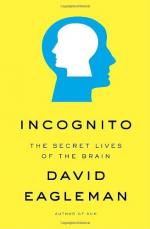
|
| Name: _________________________ | Period: ___________________ |
This test consists of 15 multiple choice questions and 5 short answer questions.
Multiple Choice Questions
1. What assumption does Eagleman dismiss?
(a) That the brain's health affects intelligence.
(b) That people have control over their behavior not matter what.
(c) That the brain is able to heal itself of most problems.
(d) That all people are equally equipped to make sound and rational decisions.
2. What does Eagleman say a man named Alex started demonstrating?
(a) A significant change in his sexual preferences.
(b) An unusual musical talent.
(c) A significant change in his television habits.
(d) An unusual mathematical talent.
3. What did some commentators say about the incident with the actor?
(a) That the man is truly anti-Hispanic and it was revealed when he was drunk.
(b) That the man is truly anti-Black and it was revealed when he was drunk.
(c) That the man is truly anti-Semitic and it was revealed when he was drunk.
(d) That the man is truly anti-Asian and it was revealed when he was drunk.
4. What does Eagleton think many sub-routines of our mind are doing?
(a) Clashing with each other.
(b) Complementing each other.
(c) Leading and following each other.
(d) Competing with each other.
5. For what was the actor in #109 arrested in 2006?
(a) Tax evasion.
(b) Wife abuse.
(c) Bad acting.
(d) Driving while intoxicated.
6. What had people noticed about Whitman in some months before his death?
(a) He seemed the same as always.
(b) He seemed full of hope.
(c) His behavior had changed.
(d) He seemed to feel much despair.
7. What does the logic puzzle that Eagleman challenges readers with involve?
(a) Colors and shapes.
(b) Shapes and numbers.
(c) Colors and numbers.
(d) Light and dark shapes.
8. What did the group do with the arresting record?
(a) Bribed an officer to destroy the record.
(b) Confronted the actor in person on live television.
(c) Made it public.
(d) Tried to get rid of the record.
9. What does Eagleman say about the question as to whether the actor is racist or not?
(a) The question is fairly black and white.
(b) If the question could be answered, we'd all be in trouble for the way we think.
(c) The question is more complex than either/or.
(d) The question is rhetorical and not important.
10. What does Eagleman say is difficult?
(a) Believing that our unconscious is so aware.
(b) Knowing that we have very little true free will.
(c) Believing that our unconscious is so unaware.
(d) Understanding and accepting that much of our minds is inaccessible to our conscious selves.
11. What has a role in how genetic tendencies might be expressed?
(a) Which genes are recessive versus dominant.
(b) Whether a trigger is there to activate a bad behavior gene.
(c) If the genes are from the paternal or maternal side of the child.
(d) A person's upbringing and environment.
12. How did Whitman die?
(a) Electrical shock.
(b) Falls out of a tower.
(c) Lightening.
(d) Shot by the police.
13. What question does Eagleman pose about the actor?
(a) Which is the real man--the bigot or the one who seems sorry for his actions.
(b) How much of the actor's life was impacted by the incident.
(c) If the actor learned his bigotry as a child.
(d) If the actor learned his bigotry from society in general.
14. What can insects do that human beings cannot do?
(a) Insects can see wavelengths we cannot see.
(b) They can see the entire spectrum of light.
(c) They can see both sound and light.
(d) They can hear light as well as see it.
15. How do some scientist define intelligence?
(a) The ability to mix emotion with thought.
(b) The ability to think more than a couple steps ahead of a task.
(c) Many small actions that can be performed without conscious thinking coming together.
(d) The ability to make very fine distinctions.
Short Answer Questions
1. What did Whitman indicate in some writings he left behind?
2. What does Eagleton point out in the beginning of the chapter about our senses?
3. What did the actor do after the incident?
4. What was discovered about Alex's health?
5. What argument does Eagleman say he is not making?
|
This section contains 762 words (approx. 3 pages at 300 words per page) |

|




